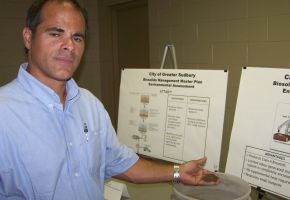The City of Greater Sudbury has been told by Vale Inco that after 2010 they no longer will be allowed to dump their sewage in their tailings pond in Lively.
That has prompted city officials to fast track a plan that will provide an alternative to the 30 year practice of dumping treated sewage sludge.
 They also will be able to greatly reduce odor complaints from residents in Lively and as far as the West End arising from use of the pond.
They also will be able to greatly reduce odor complaints from residents in Lively and as far as the West End arising from use of the pond.
The plan calls for the construction of a facility that would take the treated sewage sludge and turn it into a mostly dry product called a biosolid.
It is an odor-free product that could be beneficial for improving soil. The plant is expected to be operational, beside Kelly Lake by 2010 and cost $30-$38 million to build.
Ward 1 Coun. Jacques Barbeau said it will be up to city council to figure out where the money will come from to build the plant.
It is estimated the production of biosolids would be in a range of four truckloads per day or 30-40 tonnes, said Shawn Scott, associate director of Dennis Consultants. They have been hired by the city to prepare a master plan for the project.
The city held a public meeting Tuesday night at the McClelland Community Centre in Copper Cliff to get public input.
City staff and consultants were informing the public on three possible long-term solutions for dealing with the odour problem from city sewage dumped in the pond.
But Nickel Belt MPP France Gelinas questioned whether biosolids, from any of the three processes, could be used for land reclamation or even sold to the public for use in their gardens.
Gelinas is calling for an outright ban on biosolids in Ontario. She questioned whether the existent regulations by MOE or OMAFRA are strict enough.
“There is a growing body of evidence that there are health effects for people and animals in areas where biosolids are applied such as the Northumberland area. The regulations deal with the amount applied per hectare not what is in it,” said Gelinas, provincial NDP critic for Health and Long Term Care.
“This biosolid material is not a benign manure product. It is a product from sewage sludge and that means it is apt to contain residues from medications, waste oil, cleaners and paints dumped down sewers, as well as heavy metals from human waste,” she said.
“I have got many calls from people, mostly in southern Ontario, who are complaining they are getting sick from living near where products from sewage sludge, liquid or solid are applied,” she said.
Shawn Scott, associate associate director of Dennis Consultants, responsible for the master plan for the treatment plant, said the end use of the product will depend on how it passes guidelines imposed by the province.
“It could be that the biosolids are available for use only on Vale Inco acid tailings areas in fenced locations where the public is denied access,” said Scott.
